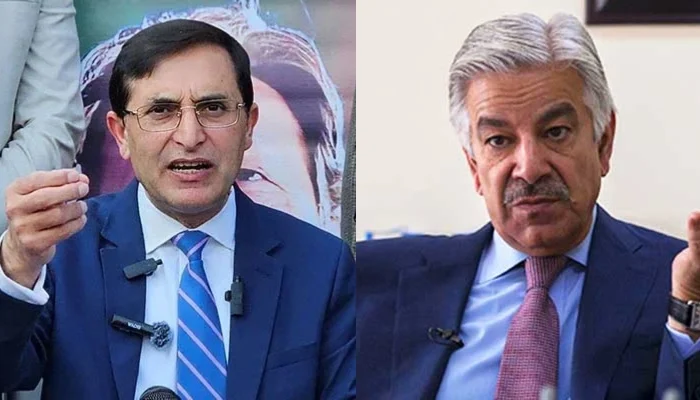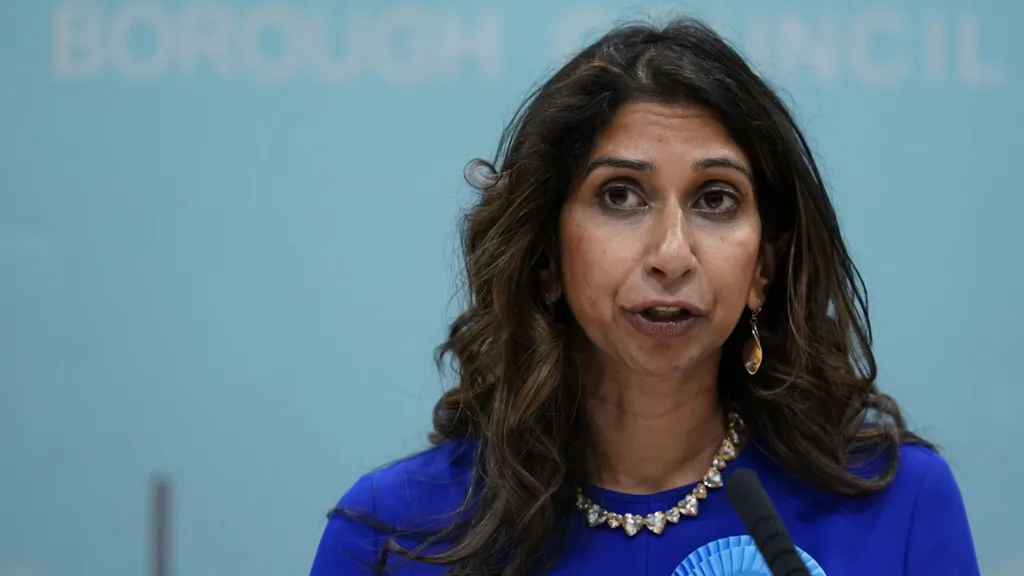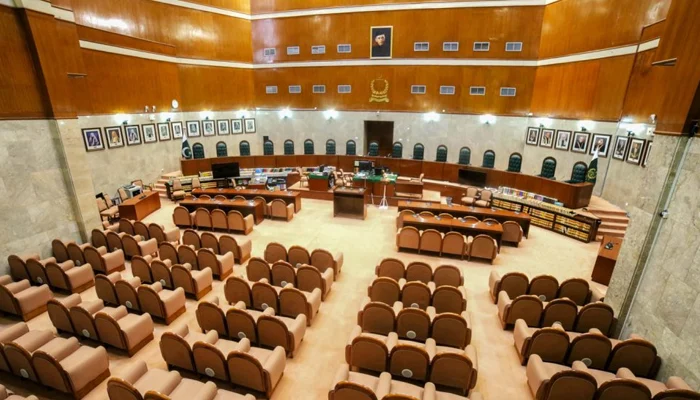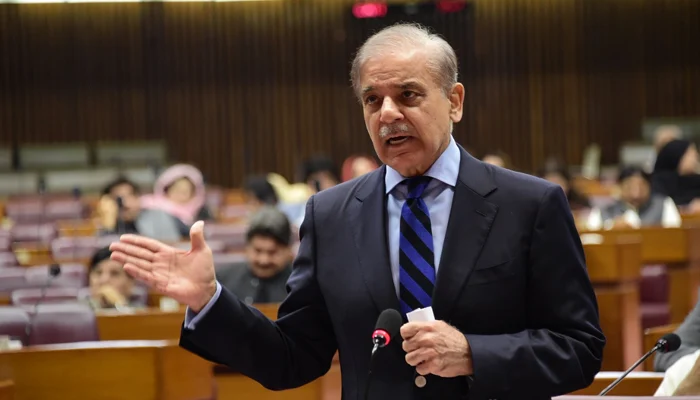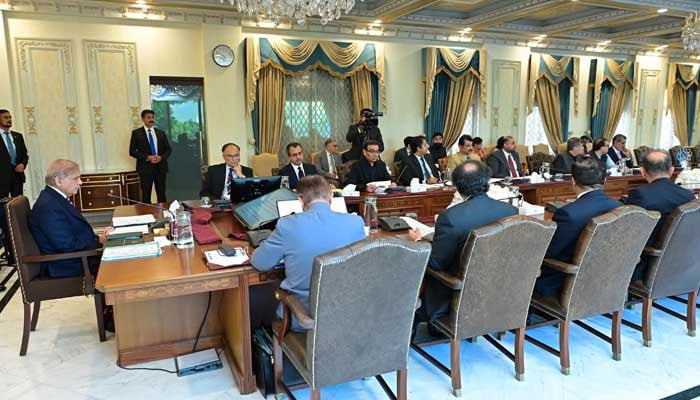ISLAMABAD: The federal cabinet is set to hold a meeting later today (Saturday) to discuss the much-hyped constitutional amendments following the approval of its draft after month-long deliberations.
After numerous political twists and turns, the government and opposition members unanimously approved the proposed 26th Constitutional Amendment.
The announcement was made after the special committee formed to debate the contentious judicial package met under the chairmanship of Pakistan Peoples Party (PPP) leader Syed Khursheed Shah.
Leaders from all major political parties, except for Awami National Party’s Aimal Wali Khan, were present in the meeting.
The draft envisages formation constitutional bench, parliamentary role in appointment of chief justice of the Supreme Court from list of three judges, restructuring of Judicial Council as well as Supreme Judicial Council, and fixing the three years tenure of chief justice.
If the cabinet approves the draft of the proposed amendments, it will be presented in Senate for approval.
The meeting of the upper house of parliament is slated to take place at 12:30pm, with govt poised to introduce the constitutional amendments.
As per Shah, everyone including the key opposition party, Pakistan Tehreek-e-Insaf (PTI) agreed on the draft that was put forward point to point, though no one has signed it yet.
However, the Imran Khan-founded party dispelled that the impression that they unanimously approved the draft.
PTI Chairman Barrister Gohar Ali Khan on Friday night said that consultation on the fourth draft shared by the government was still underway, adding that they would make final decision on the Constitutional Package after meeting with their party founder, who is currently incarcerated in Adiala Jail in multiple cases.
Responding to PTI’s reservations, PPP Chairman Bilawal Bhutto-Zardari has warned said that he will be compelled to take “controversial path” for the passage of the amendments if the opposition parties refused to support his efforts to pass the judicial package with consensus.
“If the opposition still refuses to support us despite so many compromises then I will be compelled to pass the amendment with the support of Pakistan Muslim League-Nawaz and the extra members,” the PPP chief said.
Meanwhile, Jamiat Ulema-e-Islam-Fazl (JUIF) has said that the rulers cannot force the party’s parliamentarians to vote in favour of the amendment.
“If the government continues to use coercive tactics we will never support the constitutional amendment even if our bodies are cut to pieces,” Maulana Abdul Ghafoor Haideri said during the debate on the proposed amendments in the National Assembly.
To pass the constitutional amendments, the government needs two-thirds majority in parliament, with sources claiming that it was short of 13 votes in the National Assembly (NA) and nine in the Senate.
Last month, the coalition government made a futile attempt to pass the constitutional package. However, the government failed to even table the amendments in parliament after the JUI-F chief refused to support the government’s judicial package, leaving the contentious amendments hanging in the balance.
The PPP leader, last week, said that the government had the option to secure the magic number under “conscience voting”.
“Despite this, efforts are being made to reach a consensus,” Bilawal had added.
It is pertinent to mention here that the top court on October 4 set aside its earlier opinion on Article 63(A) — a clause which deals with defection by lawmakers — as a five-member bench led by CJP Isa unanimously allowed a review petition, filed by the Supreme Court Bar Association.
The move paved the way for defecting votes to be counted.
The amendments’ draft proposes the establishment of constitutional benches of the Supreme Court via an amendment to Article 191 of the Constitution, by virtue of the insertion of new Article 19-A which reads “there shall be as many constitutional benches of the SC, comprising such judges and for such term, as may be determined by the Judicial Commission of Pakistan, from time to time”.
The constitutional benches, as per the amendment draft, may comprise an equal number of judges from each province.
Also, only the constitutional bench will have the power to exercise powers under Article 184 of the Constitution; and exercise appellate jurisdiction under clause (3) of Article 185 where a judgement or order of a High Court passed under Article 199 involves the constitutionality of any law or a substantial question of law as to the interpretation of the Constitution and advisory jurisdiction under Article 186.
Furthermore, the constitutional bench, under clause (2) will include no less than five judges who will nominated by a committee of three most senior judges from amongst the judges determined under clause (1).
On the much important issue of the appointment of the Chief Justice of Pakistan (CJP), the draft proposes that the country’s top judge will be appointed on the recommendations of the Special Parliamentary Committee which will suggest names from amongst the three most senior judges of the apex court.
The committee, as per the draft, will send the name to the prime minister who will forward the same to the president for appointment and in case of refusal by the nominee to accept his/her appointment, the next most senior judge shall be considered by the committee and so on till the appointment of the CJP.
The committee will comprise 12 members with eight lawmakers from the National Assembly and four from the Senate and will have proportional representation of each parliamentary party based on their strength in Parliament.
With an amendment to Article 179, the draft suggests the addition of provisions including the one limiting the CJP’s tenure to three years or “unless he sooner resigns or attains the age of sixty-five years or is removed from his office in accordance with the Constitution, whichever is earlier”.
“The CJP, on completion term of three years, shall stand retired notwithstanding his age superannuation,” reads the draft.
Moreover, the committee, by majority of its total membership, within 14 days prior to the CJP’s retirement will send the nomination as provided in clause (3): Provided that the first nomination under clause (3), after commencement of the Constitution (26th Amendment) Act 2024, would be sent within three days prior to the retirement of the CJP.
Also, none of the decisions or any action taken by the (judicial) commission or the committee will be invalid or called into question only on the grounds of the existence of a vacancy therein, or of the absence of any member from any meeting thereof.
The draft provisions for the committee’s in-camera meetings and maintaining of its records. However, the committee’s sessions will not be subjected to the provisions of Article 68 and the body will be allowed to make rules for regulating its procedure.
The draft proposes a restructuring of the Judicial Commission — for the appointment of SC judges — which will be headed by the CJP and comprise four senior-most judges of the SC along with the federal Minister for Law and Justice; the Attorney General of Pakistan (AGP), a representative of the Pakistan Bar Council for a term of two years; two members from the Senate and two members from the NA — two from the treasury benches, one from each House and two from opposition benches, one from each House.
Meanwhile, the nomination from the treasury benches will be made by the Leader of the House and from the opposition benches by the Leader of the Opposition.
When the National Assembly stands dissolved, the remaining two members for the purpose shall be nominated by the Senate in the aforesaid manner for such period.
Furthermore, a woman or a non-Muslim qualified to be a member of the Senate as a technocrat, will nominated by the National Assembly Speaker for a term of two years in the JC.
The draft also proposes that the Commission would conduct an annual performance evaluation of judges of the high courts and if a judge’s performance is found to be inefficient, the body will grant the said judge a period for improvement and upon culmination of which it will send its report to the Supreme Judicial Council (SJC) if the performance is found to unsatisfactory.
Additionally, the amendment also includes changes to Article 193 of the Constitution provisioning the substitution of clause (2) which sets out the requirement of at least 40 years of age and Pakistani citizenship for a person to become a judge of a High Court and who (a) has been an advocate of a HC for at least 10 years or (b) has held a judicial office for a minimum of 10 years.
The amendment also proposes a restructuring of the SJC via tweaks to Article 209 of the Constitution and suggests that the body is to comprise the CJP, the two next most senior judges of the SC, and the two most senior chief justices of the high courts.
An SC or a high court judge not be removed from office except as provided by this Article and the Council shall issue a code of conduct to be observed by judges of the Supreme Court and the high courts.
The constitutional tweaks also suggest amending Article 48 and its clause (4) and says: “The question whether any, and if so what, advice was tendered to the President by the cabinet, or the Prime Minister, shall not be inquired into in, or by any court, tribunal or other authority.”


